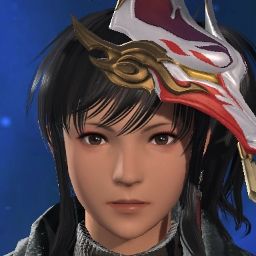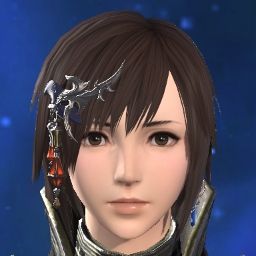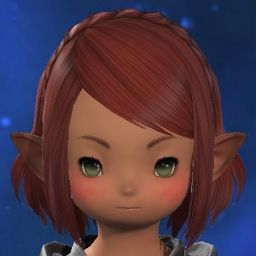As I've said before with friends and on this forum, approaching the text from a Watsonian perspective, pretty much the only way you can make Venat's character coherent is understanding she's very much like Hermes - had a pre-existing dissatisfaction and unease with Ancient society to begin with, then had "confirmation" of those beliefs through her acquaintance to the WoL and Meteion's report. Venat's response to Hermes's test not being "no, we can't let this happen! We have to save as many as possible!" but rather "Yes, we must rise to be equal to his challenge, bring it on" is very telling. She completely agrees with him that "people must prove they're worthy to exist" and "the Ancients have to prove this by reacting in the Correct way to overwhelming despair (so I will let the Overwhelming Despair play out and observe them like bugs under a microscope)."
The other aspect I find utterly baffling in regards to the approach to the Ancients being "scary" is - look at the world we live in, and actually look at the Sundered world. It's hilarious that they actually expected us to be outraged over the Ancients being willing to "take life" when they see it as justified - let alone the demonstrations of this being butterflies and an out-of-control murder wolf. Meanwhile, here I am, checking my leatherbound planner, using my communication technology whose materials are almost certainly produced in highly unethical and inhumane ways, thinking about what meat I want to unnecessarily and indulgently consume for my evening meal later on. If a spider dares show its face while I am doing this, I will crush it, for it does not belong in the perfect space I want in my room. And I consider myself a relatively harmless, benign person who doesn't actually engage in violent crime, hunting for sport, actively participating in or beginning wars, etc. Either they didn't think this through at all, or this premise is coming from an incredibly sheltered place, or both. The only way I can make any sense of people uncritically going along with these premises is if they were pre-disposed to look for any reason to justify the demise of the Ancients, and pin the blame for their slaughter as "their own fault."
Figuring that people would near-universally see a peaceful, consensual death (in a universe where reincarnation is a fact and the people who practice this are ageless) would also be horrifying and scary is also something I file under "are you just really, overwhelmingly naive here or"
-
07-30-2022 02:44 AM #6431(12)
Last edited by Brinne; 07-30-2022 at 03:09 AM. Reason: wording
-
07-30-2022 03:31 AM #6432Player

- Join Date
- Mar 2022
- Posts
- 655
- Character
- Victoria Crowny
- World
- Hyperion
- Main Class
- Black Mage Lv 90
Yeah, that's what made the scene with the petaluda, where the game godmods our WOL into being "shocked" about Hyth's actions, so weird. These quotes put it in better words than I can:
(5)
-
07-30-2022 03:43 AM #6433
-
07-30-2022 03:52 AM #6434
When I was going through Elpis, my response to almost all of the intended "scary" stuff was genuinely: oh gosh, this is wonderful, what a massive upgrade compared to the world we live in now! Imagine taking life only when there's a concrete purpose or out of a sense of greater responsibility of stewardship to the planet, as opposed to arbitrary killing for pleasure, curiosity, or convenience, like what happens every single day on a mass scale here. Yes, there are caveats, but "death is expected to have some sort of justification in the case of animals and be fully consensual in the case of people" sounds downright idyllic from the perspective of living on good old modern Earth. My reaction to the whole "return to the Star" ritual as described was also legitimately: "Oh, how interesting. This sounds really wonderful, actually." I realize it's a complicated issue with a lot of varied and valid perspectives, but I generally am supportive of end-of-life care, so I honestly just took it as being exactly that.
That's not to say the Ancients didn't have room for improvement or were literally perfect or flawless. As bad as Hermes was, I did think that in general he had a valid point to raise in terms of being more sensitive and compassionate towards the fear of the creations of being killed - that perhaps there was a way to do it more humanely or with more deliberation (with the caveat that the Ancients were established to be far more humane in their euthanizations already than, again, our world.) Some of the sidequests demonstrated that the Ancients at the point they were then, as a whole, (because this was demonstrated to us through other Ancients trying to make those around them see otherwise) were a bit short-sighted in not seeing how a flawed creation could lead to greater innovation and something greater in the long run. (Of course, this is undermined by how downright eager and excited we also see them get most of the time when shown alternative perspectives through us.) And I can even see the end-of-life ritual hypothetically eventually pushing to that place where people feel pressured and uncomfortable to it on a troubling scale - but the story, for me, failed to establish their world as we saw it as going that far either in a way that would even begin to make me think "scary." It's like me, being used to my cheap-ass diet, poor cooking skills, and the sloppy fried rice I make almost every night, looking at a world-renowned chef's work and going loftily full "your work is fundamentally flawed and is best served as an example of The Path One Must Not Go Down." Talk about getting ahead of yourself...?
And then there's how utterly confused the different tenors of the message are - being mortal and having short, fleeting lives struggling for meaning is good, which necessarily means being immortal is comparatively bad (except when it isn't: see the dragons), but then the immortals embracing a peaceful cycle of death is also bad, and--ah yes, there isn't actually a coherent or clear moral threadline here, the actual founding point of all of this is Ancients Bad and Were Doomed. They're bad if they embrace death and they're bad if they refuse to embrace death. Wars are bad but the Ancients were so peaceful that they're Also Bad, we must Bring Back War.
Venat being uncomfortable with people hyping up her death is perfectly valid, on her part, as an individual - and it sucks for her that she is made to feel uncomfortable, though obviously it's out of well-meaning insensitive ignorance, rather than anything like malice. If she doesn't want to return to the Star, no one should trouble her about it. But Venat's problem - yet another thing you can commonly find among real people and in real discourse - is assuming that because she doesn't like something or is uncomfortable with it, it must be objectively bad and lead to bad things and people who feel differently from her are on the "wrong path" and need her guidance to correct. The issue as presented doesn't have the nuance of "we should be careful about not pressuring people to Return if they don't wish to, or codifying a weird cultural expectation about it," it's that "Venat doesn't want to return, no one should want to return, that is fundamentally Wrong." In this way, in a pure Watsonian vacuum, I find her sort of fascinating. Any inch of Doylism, though, and it becomes downright infuriating. Of course I understand what the story is trying to do and communicate, but again, the most generous evaluation I can give for the writing behind it is "you must be incredibly, unbelievable naive to actually think this would sell."(12)Last edited by Brinne; 07-30-2022 at 04:08 AM.
-
07-30-2022 04:08 AM #6435Player

- Join Date
- Aug 2011
- Location
- Limsa Lominsa
- Posts
- 2,216
- Character
- Midi Ajihri
- World
- Hyperion
- Main Class
- Arcanist Lv 100
I went over this a few months ago, but I feel like everyone is remembering this scene wrong. There wasn't a "shocked" moment. Our responses were "Oh turn living beings into clothing? Just like that?" and "Won't someone be angry with us for using those creatures?" both responses are given with a blank face and no shock.
I don't think the writers intended for us to go "hmm" there, but at the point where they were making flying wolves that can breathe fire for no better reason than that they could.(1)
-
07-30-2022 04:13 AM #6436Player

- Join Date
- Mar 2022
- Posts
- 655
- Character
- Victoria Crowny
- World
- Hyperion
- Main Class
- Black Mage Lv 90
As I've mentioned before, the main problem with Endwalker and, indeed ones that a lot of media fall into both Eastern and Western, is falling into "Humanity Worship", whereby humans (or whatever creatures are similar enough to them) are presented as being way more special than any other creatures, with the preservation or cultivation of humanity being a worthy end in and of itself.
In short, "humans" and all of our characteristics, both "positive" and "negative" are all good, necessary or justified.
Endwalker's plot doesn't work unless you inherently believe that. The Ancients are supposed to be "scary" because they lack arbitrary traits that make us humans in real life (oh no, they're immortal, have no scarcity whatsoever, and have virtually no internal conflicts whatsoever...how horrible!). This, in turn, makes you have to explain why things that are objectively terrible things (such as suffering and death) are actually totally good and things that would be objectively good (like, y'know, literal PERFECTION) are actually really, really bad and you should never want it ever because it's actually completely worse.(6)
-
07-30-2022 04:14 AM #6437
*SIGH* It bugs me so much that none of what you said will probably ever be addressed. As I see it, the two reasons given in the Q&A for why Venat sundered the world are mutually exclusive yet so few people seem to see it that way? I can't tell you how many times I've seen someone say, "The Ancients had no chance of defeating Meteion due to their dense aether" alongside "Venat tried her best, but the Ancients refused to change." Um, if Venat truly believed the Ancients incapable of defeating Meteion due to their aetheric density then any attempts at getting them to change was a ruse.
Also, while I know it wasn't intended, I was thinking today that Venat should have actually loved the calamities given that they seemed to occur when mankind reached certain levels of advancement. :P
As for the 'scary' part, I can't help but wonder if Yoshi-P didn't read/play through the side quests at all, which completely undermine the main narrative. Also, yes, I very much got the impression that whoever thought Hermes' motivation was going to be compelling is blissfully unaware of where their food comes from or what type of animal testing happens in the real world. Elpis was a paradise comparatively.
I get the feeling that a lot of EW boils down to, "Oh, well, we didn't think of it like that." I suspect it might be an unfortunate side effect of cramming the whole story into 6.0. I've theorized that the reason the conflict over the 3rd sacrifice was dropped is because they saw player feedback and realized it was going to be difficult to flesh out while maintaining the Ancients as sympathetic. They really, really needed feedback halfway into EW before concluding it. We're unfortunately stuck with it now because, much to my perpetual bewilderment, many people accepted the premise of Venat and her role as as some kind of selfless, mankind-loving heroine. I figure they're either going to have to drop the subject or walk a fine line between appeasing her fans and not making the situation worse for those who did not take that view of her. I think the fact that an increasing amount of people are coming around to the story having these issues is working against them too as I'm encountering more going through EW now on an alt and seeing the problems they missed the first time.(13)
-
07-30-2022 04:17 AM #6438
In the greater context of the story, no, I'd say it's pretty obvious that the scene with the butterflies is meant to be a discomfort point in the larger picture painted of the Ancients being "scary."
Also, re: flying wolves - you can go back and forth on the nuances of this based on the limited presentation we were given, but the works of creation we see on Elpis are to help create and support a robust ecosystem, and the entire purpose of Elpis itself is to be responsible and make sure you don't just go around unleashing on-a-whim creations that would ultimately do harm or have poor quality of life. Saying "they were making flying wolves for no better reason than they could" is really reductive, and feels like another part of "Ancients are Wrong no matter what." Are they being irresponsible in their use of Creation magic, silly people playing at gods making fire wolves and walking sharks, or are they too responsible and stringent, hence the process in Elpis that sometimes involve Euthanization to make sure creations can't do greater harm - and are reflective of a society that's too conformist? Well, either way, the most pressing, urgent point is that they're Wrong, okay?
And again, this concern just seems really absurd to me to point and condemn about from the context of our own world. People kill animals for leather and meat for objectively completely unnecessary clothing items, accessories, and dishes for no reason "other than they can" or "it seems cool and interesting." People kill just because they think the process of hunting and killing is fun. Even in the worst reading of the Ancients' practices in this regard, the best I can come up with is, "well, probably not great, but definitely still better than what we have now, overall."
I truly do appreciate that EW obviously had benevolent intent in "uplifting and cheering on the player" in a time when so many of us are struggling, but the way they went about it - basically one-sided "YOU'RE NUMBER ONE! YOU'RE NUMBER ONE! BETTER THAN ALL THE REST!" is, bluntly, probably the most juvenile and most self-absorbed way possible to go about it. But realizing the intent was well-meaning, just not remotely well thought-out (or so I continue to hope), is exactly why I'm willing to post and talk about it and provide feedback rather than just "nope, values too dissonant from mine, I'm out."(11)Last edited by Brinne; 07-30-2022 at 04:23 AM.
-
07-30-2022 04:24 AM #6439Player

- Join Date
- Mar 2022
- Posts
- 655
- Character
- Victoria Crowny
- World
- Hyperion
- Main Class
- Black Mage Lv 90
I don't agree, simply for this question: why bring attention to it in the first place?
If we, the players, are not meant to see it as a big deal, what is the point of that quest objective and dialogue (aside from padding)? They could have easily had Hyth grab a couple of flowers with the same "aetheric resonances" or whatever, and make your robes that way. What purpose does having the player go out and weaken these pretty butterflies, have Hyth turn them into clothes, and then have the WOL comment on the process serve?
To me, the answer is obvious: to make the Ancients seem "less human". Even if we look at this from a less questionable standpoint of "The WOL was surprised they can do it so efficiently"....who cares? We've known since ShB that all of the Ancients have creation magicks. Even if the goal was to recap this for the players, they could have said, "Oh, that must be the creation magicks I've heard about." But the way the issue is raised in both questions (although, I'd love to see what the original Japanese wording was for the second option) makes it clear that the Ancients are very callous about how they use living things.
Especially given that they basically see the WOL as just a "more complicated" version of the petaloudai, it gives a very "They could do this to you, next" vibe.(3)Last edited by CrownySuccubus; 07-30-2022 at 04:26 AM.
-
07-30-2022 04:30 AM #6440
Lol, this echoes almost exactly a conversation I had with tokinokanatae about "what the hell went wrong with Elpis," when she pointed out that the expectation was probably that the player would be uncomfortable and find Elpis "scary" because they should identify with the creations, right? And thus have the question of "oh no, would they just casually unmake me to make a robe because I'm not perfect!?" hanging over their heads and troubling them the whole time they're exploring the area.
Of course, this didn't work out in practice for a number of reasons in both writing and presentation. As I've mentioned before, both Amaurot in Shadowbringers AND Elpis in Endwalker had the exact opposite effect for me - because the Ancients were so clearly human with human idiosyncrasies, but lived in a world they had crafted that didn't have true malice, I felt incredibly safe and comforted in their world, and seeing Ancients be stubborn and frustrated and sometimes at a loss without anything like the Final Days pressing down on them made me think "they'd definitely have room for someone as stubborn and frustrating and confused as I often am! This is great! I want to be here, where I can be myself AND also be safe and surrounded by well-meaning people I can trust!"(6)Last edited by Brinne; 07-30-2022 at 05:00 AM.





 Reply With Quote
Reply With Quote











